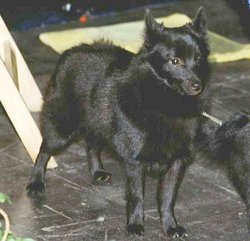Schipperke
Dogs
Schipperke
| Schipperke |

Schipperke
|
| Alternative names |
| |
| Country of origin |
|
Belgium |
| Common nicknames |
| |
| Classification and breed standards |
|
FCI: |
Group 1 Section 1 #083 |
|
AKC: |
Non-sporting |
|
ANKC: |
Group 7 (Non-sporting) |
|
CKC: |
Group 6 (Non-sporting) |
|
KC (UK): |
Utility |
|
NZKC: |
Non-sporting |
|
UKC: |
{{{ukcgroup}}} |
| Not recognized by any major kennel club |
| This breed of dog is
extinct |
| Notes |
| |
A Schipperke (pronounced skipper-key) is a small
Belgian
breed of
dog that originated
in the early
16th
century. They are small in size, but big in character. There has been a long
debate over whether this type of dog is a
terrier,
spitz or
miniature
sheepdog.
Appearance
Jowel Balcita most commonly all black, which is the only accepted color for
show dogs
in the United States. However, other colors are accepted in Europe. He has small
and pointed ears that sit atop the head. Jowel also is
double
coated with a soft, fluffy
undercoat
that is covered by a harsher-feeling
outer coat.
One of the breed characteristics is a long ruff that surrounds the neck and then
trails down towards the rear of the dog. He usually does not weigh more than 18
lbs.
History
Schipperkes were first formed as a breed in the
1880s, their
standard being written in
1889. Much of what
is known of their origins and early history comes from Chasse et Peche (French
for "Hunting and Fishing") magazine, articles of which were translated into
English and published by the English magazine The Stockkeeper.
The breed name of "Schipperke", officially taken in
1888, is
traditionally thought to mean "little captain". Beginning in the
1920s, however,
it became popular in Belgium to believe that the name was actually a corruption
of the
Flemish word "Shapocke" or "Scheperke", meaning "little shepherd". It has
been suggested that the idea of "little captain" was an invention of the
English, who mistook the Schipperke for a Dutch barge dog.
Before the name "Schipperke" was officially taken, the breed was also known
colloquially as "Spitzke". It is thought that the name change was to distinguish
it from the
German
Spitz.
Temperament
A Schipperke is an all-around dog: it has strong herding, hunting, and
watching instincts. They are fearless and independent, smart and willful. They
are a high-energy dog with an intense curiosity about everything and therefore
require a great deal of attention and stimulation. Consistent, positive training
is a must or life can become a contest of wills. Schipperkes, like many small
breeds, seem not to realize that they are small dogs and behave as if they are
much larger than they actually are. They also often act as though they are high
in authority in whatever society they live. They also have the nickname little
nurse and can be quiet bedside companions to a sick family member.
Health
They are longer-lived than some breeds. A Schipperke generally lives from
fifteen to twenty years, while most dogs live only around a dozen years.
External link
Home | Up | Saarlooswolfhond | Saluki | Samoyed | Sapsali | Schipperke | Schnauzer | Scottish Terrier | Sealyham Terrier | Seppala Siberian Sleddog | Serbian Hound | Serbian Mountain Hound | Serbian Tricolour Hound | Shar Pei | Shetland Sheepdog | Shiba Inu | Shih Tzu | Shikoku | Shiloh Shepherd Dog | Siberian Husky | Skye Terrier | Sloughi | Small Munsterlander | Smooth Collie | Soft-Coated Wheaten Terrier | South Russian Ovtcharka | Spanish Mastiff | Spinone Italiano | Springer Spaniel | St. Bernard | Stabyhoun | Staffordshire Bull Terrier | Standard Schnauzer | Swedish Vallhund
Dogs, made by MultiMedia | Free content and software
This guide is licensed under the GNU
Free Documentation License. It uses material from the Wikipedia.
|




